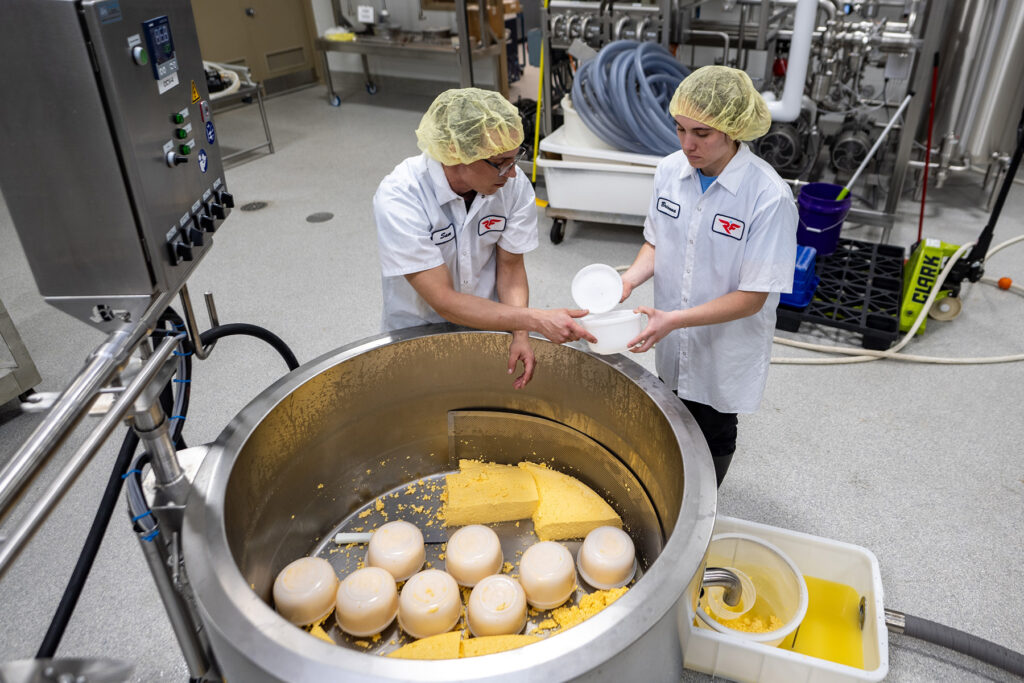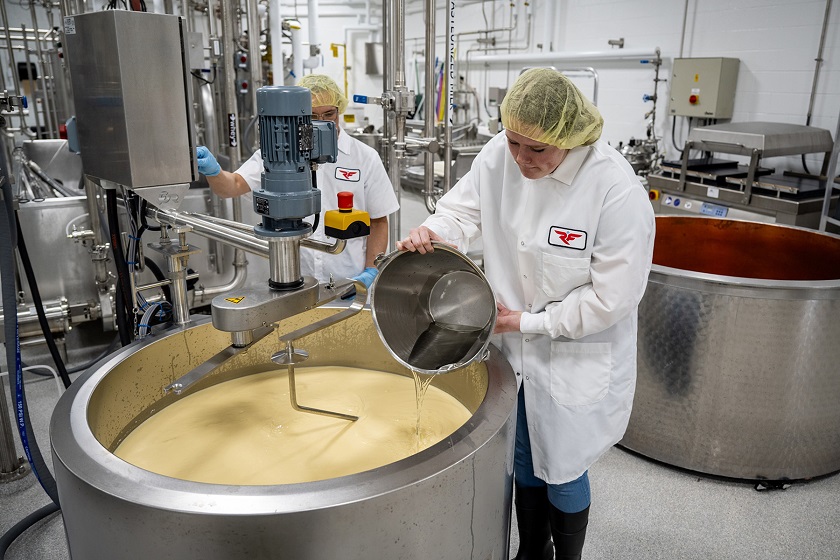
Brianna Crotteau, project coordinator at the Wuethrich Family/Grassland Dairy Center of Excellence at UW-River Falls, hands Sam Galgowski, a cheesemaker at the dairy plant, a plastic container that Galgowski filled with cheese during production on Tuesday. The cheddar cheese produced was the first produced at the dairy plant that will serve as a production site and a training location for students and dairy industry employees. UWRF/Pat Deninger photo.
New, much-anticipated $9 million facility will serve as site to train students, dairy industry employees
River Falls, Wis. – With one slice, then another and another, Sam Galgowski cut a large block of cheddar cheese at the bottom of a metal vat into smaller chunks.
Galgowski – cheesemaker at the Wuethrich Family/Grassland Dairy Center of Excellence at the University of Wisconsin-River Falls – then lifted individual pieces of cheddar and packed them into round plastic containers before flipping the containers over so the cheese inside would drain and compact. Brianna Crotteau, project coordinator at the dairy pilot plant, smiled with relief.
“Hey, it worked. We have some cheddar cheese here,” Galgowski said. “We’re going to have some rounds of cheese.”
The successful finished product five hours after the milk that was processed into cheese was first pumped through the dairy pilot plant’s tanks and pipes represented much more than a simple batch of cheddar.
The cheese is the first produced at the plant that has been a decade in the making and holds the aspirations of state of Wisconsin and dairy industry officials as a site to not only produce cheese and ice cream but to train UW-River Falls students and dairy industry employees to work in a modern dairy setting. The plant also will serve as a test site, a place to experiment with developing different varieties of cheese and ice cream.
Work began 11 years ago to begin building a new dairy pilot plant to replace the longtime plant at UW-River Falls that had become outdated. The old plant ceased operations in 2018 because of its antiquated equipment.
Former dairy pilot plant manager Michelle Farner worked with agriculture industry leaders and the Wisconsin Department of Agriculture, Trade and Consumer Protection, among others, to come up with funding to build the new plant, renamed the Wuethrich Family/Grassland Dairy Center of Excellence after $1 million in donations helped make the plant a reality.
Outfitting the new plant took longer than anticipated and was delayed in part by the coronavirus pandemic. But Farner and others remained committed to the project, and in October, the new 6,000 square-foot, $9 million plant was officially opened.
Farner subsequently took another job and was replaced by Rueben Nillson, whose background making cheese in different settings makes him the perfect fit for the job, Farner said. Since taking over as dairy pilot plant manager, Nilsson has worked to get the plant up and running, working out kinks in the production equipment and process.
Making cheese on Tuesday was beset by early difficulties, but those were quickly remedied, and the process proceeded. Nilsson monitored electronic controls signifying whether the different equipment components were working together to ensure a quality end product.
“There are a lot of steps, a lot of different factors to keep track of to make sure everything is working as it should,” Nilsson said in between checking two different monitoring screens. “There are a lot of different pieces of equipment that need to work together for this to work, and we’re making sure that they’re all talking to each other the way they’re supposed to.”
Tuesday’s successful cheesemaking effort marks a significant milestone to get the much-anticipated dairy pilot plant up and running. Another will be ice cream production. Nilsson hopes to begin making ice cream in the plant soon. Those products will be sold at Freddy’s Dairy Bar on campus under the brand name Falcon Creamery.
In addition to producing tasty, quality dairy products, the dairy pilot plant also will serve as a valuable training site. UW-River Falls student Makenzie Skibbie, a junior from Thorp majoring in food science and technology, has started working at the plant. She makes cheese in small batches with her mom and has worked at cheese production sites. She said the dairy pilot plant will be a valuable role in training her and others in a plant with state-of-the-art equipment.
“This site will educate us about how to work at modern dairies,” she said. “When I get into the cheesemaking industry, I will look really good to employers, and I will come into my job with confidence.”
Crotteau, of Cameron, who graduated from UW-River Falls in May, said the new dairy pilot plant enables students and others who train there to learn about all aspects of dairy production.
“They will be able to be a part of all the steps of this, from the milk being produced at Mann Valley Farm (which UW-River Falls operates), to all aspects of the production process, to being able to produce the finished product.”
On Tuesday afternoon, Nilsson was pleased to see that the final product had turned out well. Two weeks earlier a run through making cheese hadn’t gone smoothly. Last week his team successfully produced a small batch of cheese curds. Now they have a full batch of cheddar to their credit.
“It feels good that this one worked out,” Nilsson said. “Now we’re going to just keep making more cheese, keep refining the process and making this go better and better. We’re looking forward to having this plant serve as an educational site that produces high-level dairy products.”

UW-River Falls junior Makenzie Skibbie adds rennet to a batch of cheddar cheese being produced Tuesday at the university’s Wuethrich Family/Grassland Dairy Center of Excellence. Rennet promotes curdling, helping transform milk into cheese. UWRF/Pat Deninger photo.
Written by UW-River Falls
Link to original story: https://www.uwrf.edu/News/Big-cheese-Successful-cheddar-production-means-UW-River-Falls-dairy-plant-is-up-and-running.cfm
